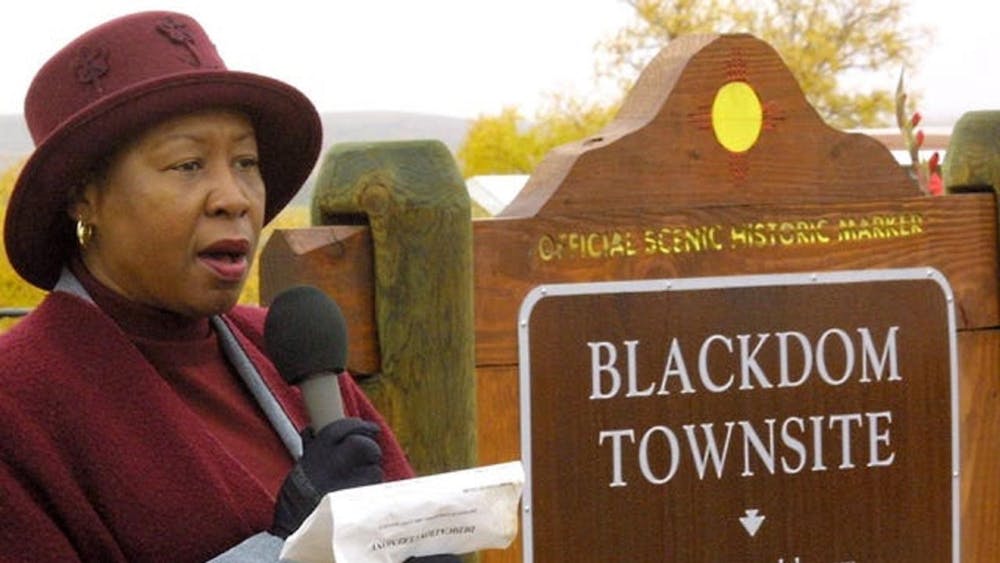Blackdom was one of New Mexico’s first Black settlements, located about 15 miles south of Roswell. It was the most important Black homestead in the state, according to the U.S. National Park Service.
One of the leaders in the creation of Blackdom, Frank Boyer, established the settlement in 1903 with 12 other Black homesteaders, according to the NPS. The community housed an estimated 150 people who began to disperse in the 1920s.
Carlyn Pinkins – a doctoral candidate in the department of history at the University of New Mexico – plans to examine Black homesteads in New Mexico, including Blackdom, in her dissertation.
Boyer and his brother-in-law traveled from southwestern Georgia to Chaves County with the idea of starting a settlement where Black individuals could flee the oppression and violence of the deep south, Pinkins said. There, leaders hoped Black individuals could seek their own prosperity, self determination and higher education without being limited by Jim Crow laws, she said.
“The founders of Blackdom really wanted to make this a town, and wanted to make it a beacon for Black people who wanted to pursue their own dreams and goals outside of the Jim Crow South,” Pinkins said.
Federal law and jurisdiction superseded local ordinances at the time of Blackdom’s creation, making Jim Crow laws more difficult to enforce, according to an essay by historian and artist Timothy Nelson in El Palacio Magazine.
Blackdom had a U.S. post office, a school, a store, churches, a pumping plant and an office building, according to the NPS.
Boyer and his wife Ella filed the official plat for the Town of Blackdom in May 1920, according to Nelson’s essay. This documented details about the terrain and mapped a township complete with blocks, streets and alleys.
“Unlike other homestead communities, where maybe the residents came to live there and were a community organically, Blackdom did have solid ambitions to become a town,” Pinkins said.
The reason Boyer and others chose Blackdom’s geographic location is something Pinkins hopes to learn, she said. The oral history states that Boyer’s father – an army wagoner – observed the available land in New Mexico and encouraged his son to travel there, Pinkins said.
“It seems kind of odd to me, being that there’s not a lot out there and (it is) pretty far from water,” Pinkins said. “But land is land. It’s an opportunity at wealth.”
Pinkins noted some discrepancies in information about Blackdom from various sources. Much of the research relies on oral history, leading to mismatched details, Pinkins said. She was initially inspired to study Black homesteads in New Mexico after noticing that the town Boyer was from had a different name depending on the article she read.
Get content from The Daily Lobo delivered to your inbox
“The information isn’t always accurate, but if you put some clues together, you can find the truth in the middle,” Pinkins said.
Another instance of inconsistent information about Blackdom centers around the settlement’s depopulation. The hardship of homesteading led residents to get jobs in nearby towns, Pinkins said. Homesteaders were required to use their land for agriculture, which was difficult in a place with limited water access.
Some residents who got jobs in nearby towns were given permission to drill wells to assist with agriculture. The main oral history states these residents lost this permission following a drought, but some – including descendants – say the wells were sabotaged by nearby white residents, Pinkins said.
Residents eventually left Blackdom and the settlement did not survive the Great Depression, according to the NPS.
What remains of Blackdom is now difficult to reach by car, as there are limited paved roads. A Senate Memorial passed in the New Mexico Legislature in 2023 to establish a task force to address accessibility to the site.
“Telling these stories will put New Mexico on the map in terms of adding our presence to the national narrative about Black settlement out west, but then also that larger narrative of Black people helping to settle the West nationwide,” Pinkins said.
Lily Alexander is the news editor for the Daily Lobo. She can be reached at news@dailylobo.com or on Twitter @llilyalexander
Lily Alexander is the 2024-2025 Editor of the Daily Lobo. She can be reached at editorinchief@dailylobo.com or on Twitter @llilyalexander






